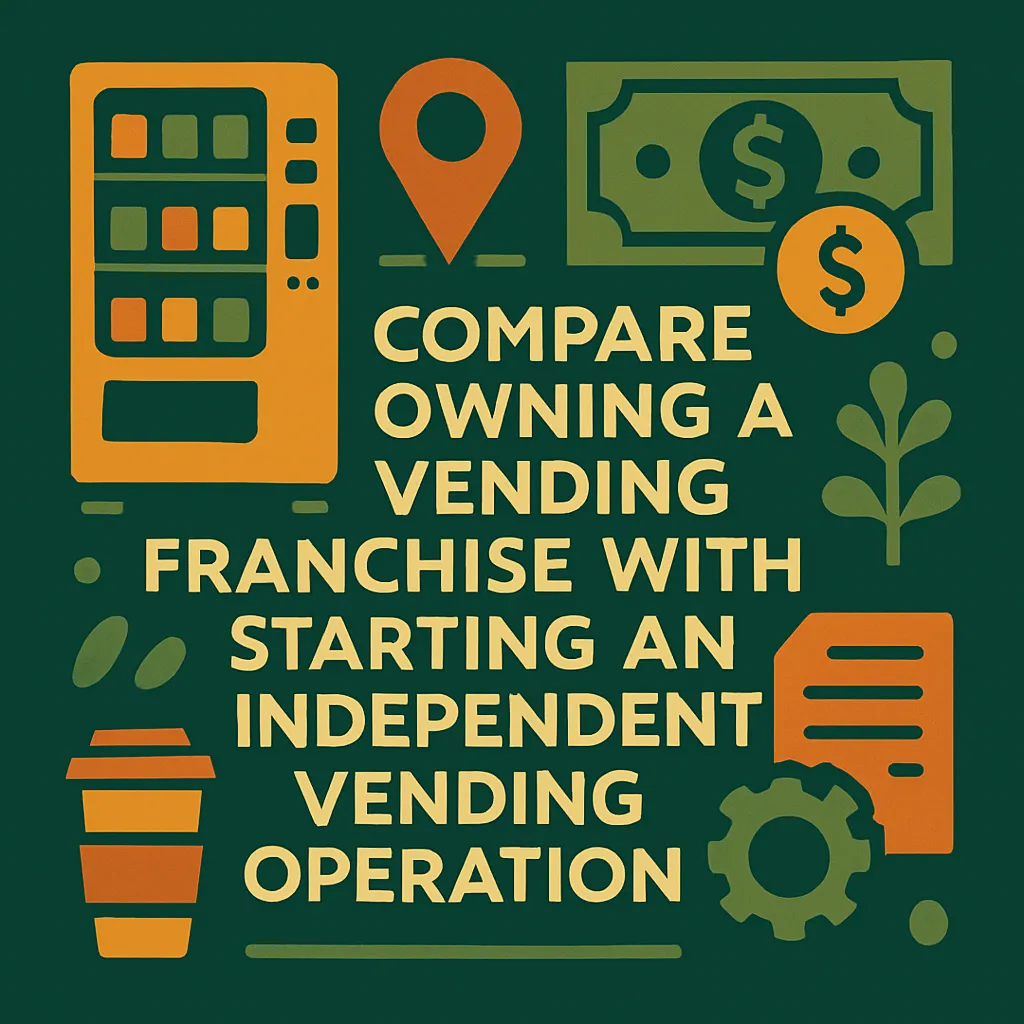Vending Franchise vs Independent Vending Business
Compare owning a vending franchise with starting an independent vending operation.
Back to Vending Franchises ResourcesCompare owning a vending franchise with starting an independent vending operation.
Back to Vending Franchises ResourcesStart your 30-day free trial and get instant SMS and email alerts whenever a local business needs vending service. These are real location leads to help you grow your route — you decide which ones to buy, no obligations or contracts.
![]() Franchises offer established brand, training, and operational blueprint
Franchises offer established brand, training, and operational blueprint
![]() Independent businesses provide full autonomy and creative control
Independent businesses provide full autonomy and creative control
![]() Both paths require dedication, market research, and strategic planning
Both paths require dedication, market research, and strategic planning
30 days free, then $39 / month.
No Commitment. Cancel Anytime.

Embarking on a vending machine business journey presents a fundamental fork in the road: do you opt for the structured path of a franchise or blaze your own trail with an independent operation? Each option comes with its own set of benefits and drawbacks, impacting everything from initial investment and operational freedom to brand recognition and ongoing support.
A vending franchise provides a turnkey solution for entrepreneurs. You purchase the right to operate under an established brand name, benefiting from a proven business model, existing marketing strategies, and often, established supplier networks. This can significantly reduce the learning curve and perceived risk associated with starting a new business. Franchisors typically offer comprehensive training, ongoing support, and assistance with everything from machine procurement to location scouting. However, this structure comes at a cost: initial franchise fees, ongoing royalties, and strict adherence to brand standards mean less creative control and flexibility compared to an independent venture. For those looking for a guided approach, exploring a vending business startup checklist from a franchise perspective can clarify expectations.
Starting an independent vending business offers unparalleled freedom. You are the architect of your own enterprise, making all decisions regarding branding, product selection, pricing, and operational strategies. This allows for greater flexibility to adapt to local market demands, pursue niche markets, and build a business that truly reflects your vision. The startup costs can be significantly lower as there are no franchise fees or royalties. However, this freedom comes with increased responsibility. You'll need to develop your own operational systems, establish supplier relationships, and build your brand from the ground up, which requires significant effort in areas like finding vending machine locations and marketing. Researching the pros and cons of owning a vending machine independently can help weigh these factors.
When deciding between a vending franchise and an independent business, consider your financial resources, risk tolerance, and entrepreneurial style. A franchise might be ideal if you prefer a structured environment with built-in support and a recognized brand. If you thrive on innovation, desire complete control, and are prepared to invest more effort in initial setup and brand building, an independent business could be your best fit. Both paths require a solid understanding of the vending industry, market research, and a commitment to customer service. Evaluate your personal strengths and weaknesses against the demands of each model to make an informed choice that aligns with your long-term business goals.
Vending Exchange connects vending operators with real businesses actively looking for vending services—including traditional machines, AI coolers, and office coffee. Get instant SMS and email alerts when new opportunities are available in your area. No contracts or monthly fees—just buy the leads you want. Start your free 30-day trial today and grow your vending business on your terms.
A vending franchise operates under an established brand with proven systems, while an independent business builds everything from scratch.
Franchises typically have initial franchise fees, equipment costs, and operational setup expenses, which can be significant.
Yes, independent businesses generally have lower startup costs as they avoid franchise fees and can source equipment more flexibly.
Franchises often provide training, marketing support, established supplier relationships, and operational guidance.
Franchise owners have less autonomy, as they must adhere to the franchisor's brand standards, product selections, and operational procedures.
Independent owners have complete control over product selection, pricing, branding, and operational strategies.
Yes, the recognizable brand name and reputation of a franchise can make it easier to secure prime vending locations.
Franchisees usually pay ongoing royalties and marketing fees to the franchisor, typically a percentage of gross sales.
The biggest risk is building brand recognition and a customer base without the support and proven model of a franchise.
An independent vending business offers greater potential to cater to unique market niches due to its flexibility in product offerings and branding.